高二英语(师大版)-选修六 Unit16Stories(7)课件(共60张ppt)
文档属性
| 名称 | 高二英语(师大版)-选修六 Unit16Stories(7)课件(共60张ppt) | 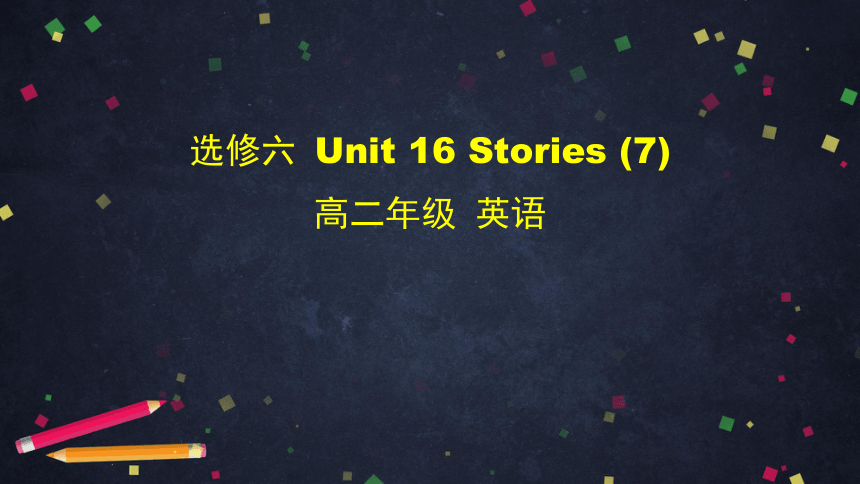 | |
| 格式 | zip | ||
| 文件大小 | 20.0MB | ||
| 资源类型 | 教案 | ||
| 版本资源 | 北师大版 | ||
| 科目 | 英语 | ||
| 更新时间 | 2020-04-30 11:44:04 | ||
图片预览

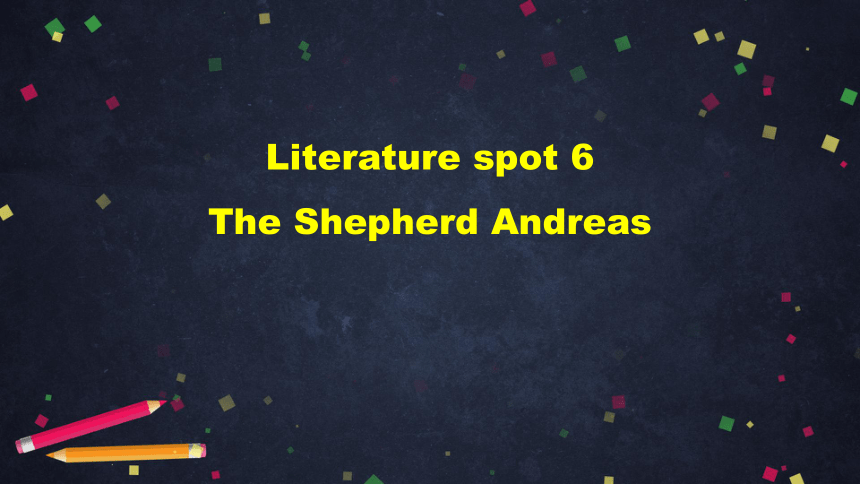
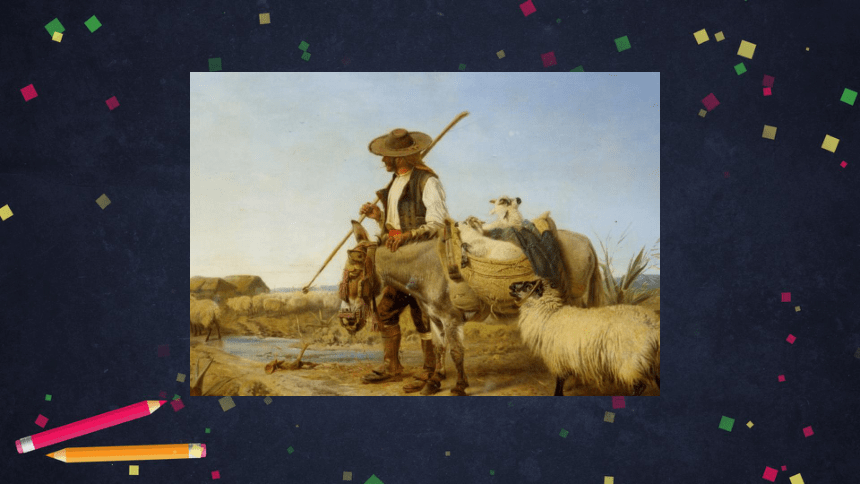
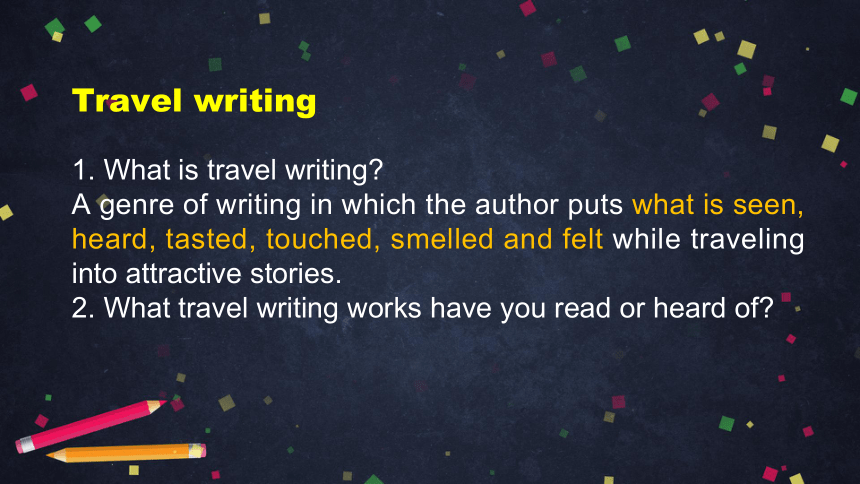
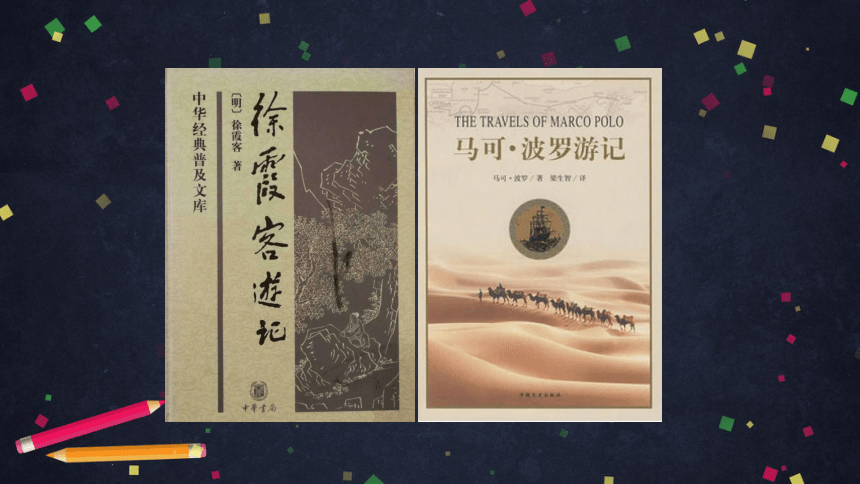
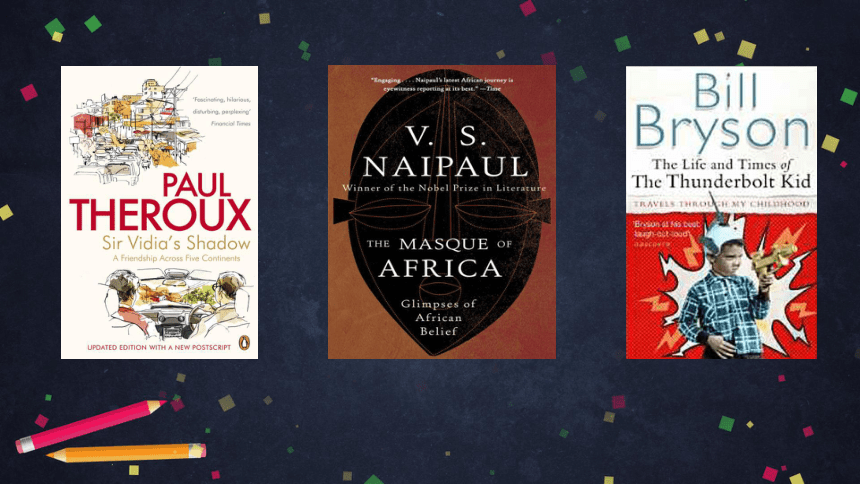
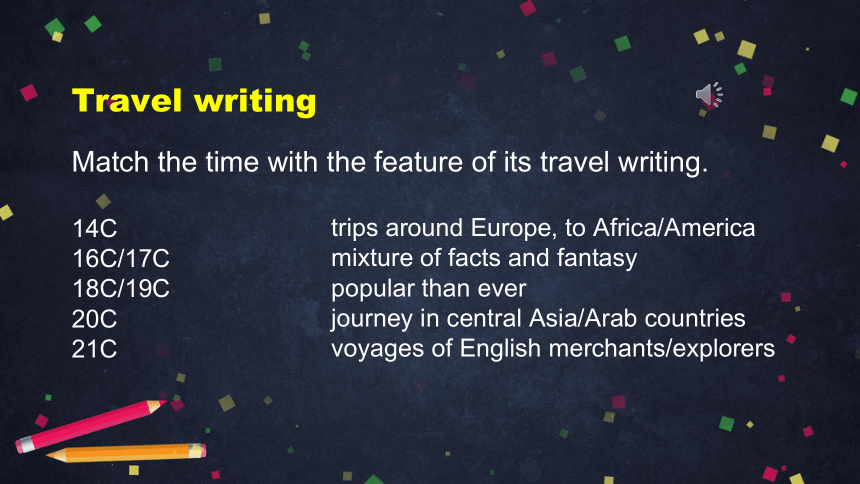
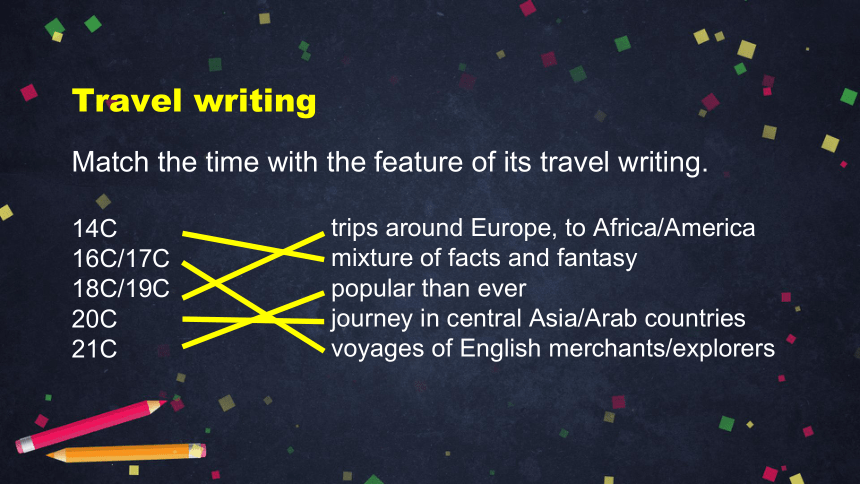
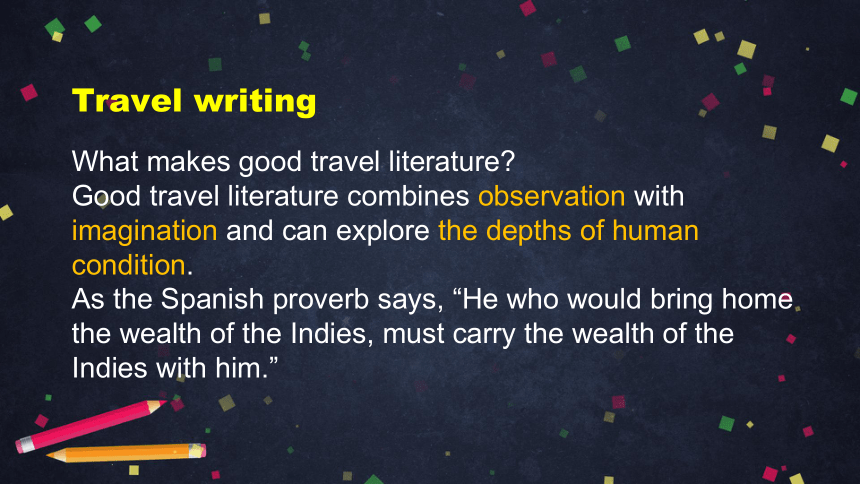
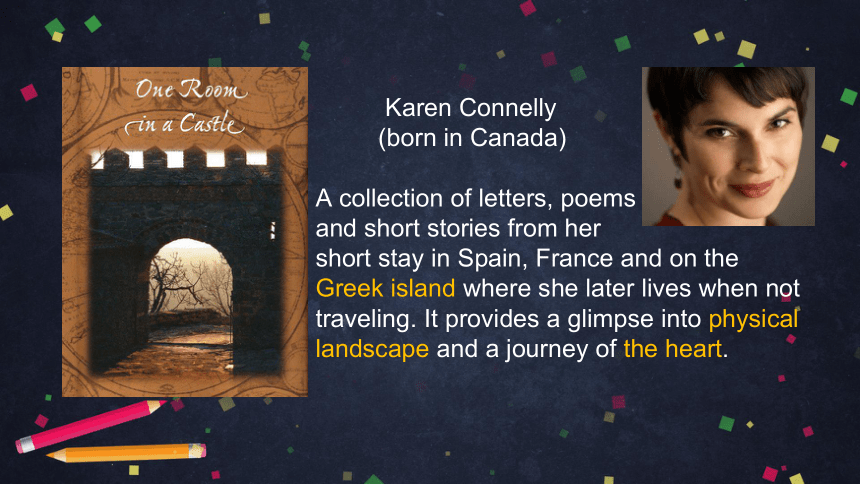
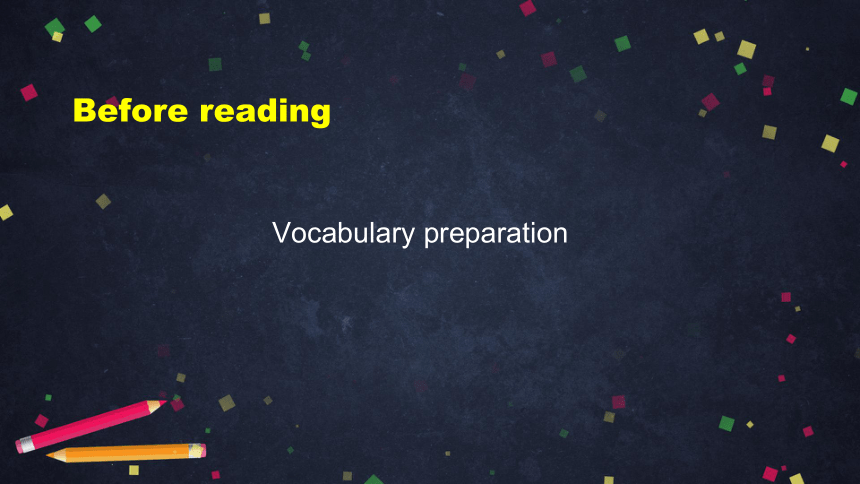
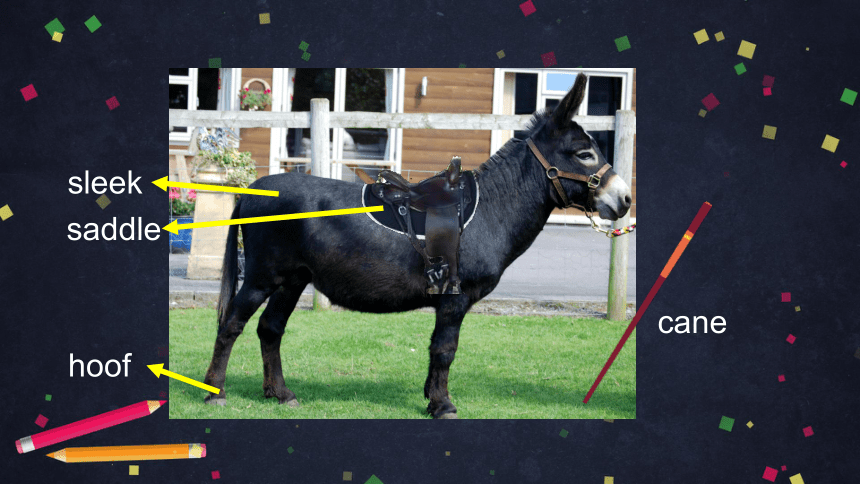
文档简介
(共60张PPT)
选修六 Unit 16 Stories (7)
高二年级 英语
Literature spot 6
The Shepherd Andreas
Travel writing
1. What is travel writing?
A genre of writing in which the author puts what is seen, heard, tasted, touched, smelled and felt while traveling into attractive stories.
2. What travel writing works have you read or heard of?
Travel writing
Match the time with the feature of its travel writing.
14C
16C/17C
18C/19C
20C
21C
trips around Europe, to Africa/America
mixture of facts and fantasy
popular than ever
journey in central Asia/Arab countries
voyages of English merchants/explorers
Travel writing
Match the time with the feature of its travel writing.
14C
16C/17C
18C/19C
20C
21C
trips around Europe, to Africa/America
mixture of facts and fantasy
popular than ever
journey in central Asia/Arab countries
voyages of English merchants/explorers
Travel writing
What makes good travel literature?
Good travel literature combines observation with imagination and can explore the depths of human condition.
As the Spanish proverb says, “He who would bring home the wealth of the Indies, must carry the wealth of the Indies with him.”
Karen Connelly
(born in Canada)
A collection of letters, poems
and short stories from her
short stay in Spain, France and on the Greek island where she later lives when not traveling. It provides a glimpse into physical landscape and a journey of the heart.
Before reading
Vocabulary preparation
hoof
sleek
saddle
cane
milk crate
chamomile blooms
guffaw
melon rinds
curved
plummet
First reading
Figure out:
2. Put the events in order.
who/where/why/how/relationship
The writer gave Andreas a cup of tea.
Andreas got a bit angry because the writer couldn’t understand.
The writer went outside with her cup of tea.
Andreas tried to show that he wanted a cup of tea.
The writer asked Andreas questions.
Andreas used his cane to get off his donkey.
Andreas started laughing a lot.
Andreas and his donkey came into view.
The sleek black donkey is called Marcos, and the old man who rides him is called Andreas. They appear early one morning while I am sitting outside, my back against the wall of the spitaki, a cup of tea cradled in my hands. The gate is on the other side of the house, out of immediate view. I hear hooves knock against the stones that mark the threshold of the gate. To give me warning, the old man shouts some unintelligible greeting that scares me out of my wits. I spill tea on my lap.
“Kaleemera,” he says gruffly, with a cautious smile. “Kaleemera,” I return the greeting and reach for my dictionary. He pulls his cane from its resting place in the ropes of the saddle, maneuvers Marcos to a stone, where he aims the cane, then slides off the donkey’s back. His lower left leg and foot are deformed; the foot fits into a black boot cut open to accommodate its dimensions. How to describe Barba Andreas, the old shepherd? A yellow piece of cloth is wrapped around his head of white hair.
He has a big white moustache, blue eyes, a dandy’s flower stuck in the lapel of his green army jacket. Hands. What will I love most here, what will I dream about years later, to return me to this place? The hands of the islanders. Their thickness, their roughness, their ugliness. Nails broken below the quick. Scars. Missing fingertips and lines of dirt.
Barba Andreas names the plants for me, pointing with his cane and leaning down to pluck off the chamomile blooms. Sitting on a
milk crate, he lifts his bad leg up to rest on a stone. I remain sitting against the house in the shade. We both take in the view before us: slender Marcos, eating my melon rinds and shifting in what is, effectively my front yard: poppies; olive trees; the curved and plummeting body of the land, its shapes of green, sage-green, yellow, almond; rose and purple and gray shadow. The sky opens over everything like wide blue hands. And all around us, lassoing the entire island, the sea.
A bearish sound comes from Barba Andreas’ throat. As though bored with the view—how familiar it must be to him—he turns back to me and says something I don’t understand. He points in my direction with his cane. Is he pointing to the low table between us? I look at the table. Is he pointing to my books on the table? I offer him a book, which he wisely refuses to touch. He pantomimes a motion, but I don’t understand. Once more, he directly asks for something and pokes his finger against his chest. I don’t
understand. Finally, smiling but clearly frustrated, he grabs the tea-pot with one large hand, pours tea into the palm of the other, and raises it to his lips. “Ena poteeri!” he cries, and bangs his cane on the ground, demanding a cup.
Embarrassed, I jump up and go into the little house for another cup. I come out, pour tea, hand it him. He waves away my apologies. He drinks the tea in one go. How many Greek words do I know now? How many? Not enough, never enough. To learn
another language one must re-acquire the greedy hunger of a child. I want, I want, I want. Every desire begins and ends with a word. I want to ask a thousand questions. Where does the path behind the house lead and who lived here before and how do you make cheese and are the sheep in the neighboring field yours and what is this place, truly, and how do I go to the mountains behind the house? Because there is a gate closing off the field that leads to the mountains, and I am afraid to walk through it.
He understands my last, garbled question. “How do you go to the mountains?” he parrots back to me, almost shouting. It is an international assumption that when people don’t hear and understand our language, we think they can’t hear at all. “How do you go up to the mountains?” Now a slow laugh rumbles in his throat. “Me ta podia!” he cries. Every line of his face proclaims laughter. He slaps his knees, guffawing.
?????
How do you go to the mountains?
???? Me ta podia. With your feet.
???? Open the gate, go through it, close it behind you. And walk to the mountains.
c) The writer went outside with her cup of tea.
Where was she?
In the yard outside of a spitaki.
(Geek word for a one-roomed shepherd’s house)
neighbor? rented his house?
c) The writer went outside with her cup of tea.
Andreas and his donkey came into view.
Andreas used his cane to get off his donkey.
Andreas tried to show that he wanted a cup of tea.
b) Andreas got a bit angry because the writer couldn’t understand.
“Ena poteeri!” he cries, and bangs his cane on the ground, demanding a cup. (para. 6)
waves away my apologies (para. 7)
c) The writer went outside with her cup of tea.
Andreas and his donkey came into view.
Andreas used his cane to get off his donkey.
Andreas tried to show that he wanted a cup of tea.
b) Andreas got a bit angry because the writer couldn’t understand.
The writer gave Andreas a cup of tea.
The writer asked Andreas questions.
(para. 5) Had she been there for long?
c) The writer went outside with her cup of tea.
Andreas and his donkey came into view.
Andreas used his cane to get off his donkey.
Andreas tried to show that he wanted a cup of tea.
b) Andreas got a bit angry because the writer couldn’t understand.
The writer gave Andreas a cup of tea.
The writer asked Andreas questions.
Are the sheep in the neighboring fields yours and what is this place.
c) The writer went outside with her cup of tea.
Andreas and his donkey came into view.
Andreas used his cane to get off his donkey.
Andreas tried to show that he wanted a cup of tea.
b) Andreas got a bit angry because the writer couldn’t understand.
The writer gave Andreas a cup of tea.
The writer asked Andreas questions.
g) Andreas started laughing a lot.
Second reading
Answer the questions:
1. Why did the writer spill her tea?
2. Why did Andreas use the cane to get off?
3. What did the writer like most about the islanders?
4. How did Andreas finally explain what he wanted?
5. How does the writer think one learns a language?
6. Why did Andreas laugh so much?
Second reading
1. Why did the writer spill her tea?
She was scared by the shepherd’s greeting.
The gate is on the other side of the house, out of immediate view. I hear hooves knock against the stones… the old man shouts some unintelligible greeting that scares me out of my wits. I spill tea on my lap.
Second reading
2. Why did Andreas use the cane to get off?
His lower left leg and foot were deformed.
The foot fits into a black boot (cut open to accommodate its dimensions).
Second reading
3. What did the writer like most about the islanders?
The hands of the islanders.
Their thickness, their roughness, their ugliness. Nails broken below the quick. Scars. Missing fingertips and lines of dirt.
Why did she like such hands?
Second reading
They are symbols of the diligent and self-reliant people, most of whom do manual work. They respect life and the nature. They follow their own hearts and enjoy a simple living.
Second reading
4. How did Andreas finally explain what he wanted?
He grabbed the tea-pot with one large hand, poured tea into the palm of the other, and raised it to his lips.
Said/pointed in the writer’s direction Book?
Pantomimed a motion Didn’t understand
Asked directly/poked against chest Didn’t understand
Second reading
5. How does the writer think one learns a language?
One must re-acquire the greedy hunger of a child.
I want, I want, I want. Every desire begins and ends with a word. I want to ask a thousand questions. (motivation)
I return the greeting and reach for my dictionary. (action)
Second reading
6. Why did Andreas laugh so much?
He thought the question the writer asked had an obvious answer (“With your feet”) .
“How do I go to the mountains behind the house? Because there is a gate closing off the field that leads to the mountains, and I am afraid to walk through it.”
Deep thinking
1. What did the writer learn from Andreas’ answer?
“How do you go to the mountains?
????Me ta podia. With your feet.
Open the gate, go through it, close it
behind you. And walk to the mountains.”
Conquer your fear and explore the unknown!
Deep thinking
2. Why did the writer describe so much about Andreas and the scenery?
Travel writing:
share experiences
express feelings and reflections
Deep thinking
2. Why did the writer describe so much about Andreas and the scenery?
1) to share experiences (what it feels like to live in this beautiful Greek island, not knowing the local language)
2) to express feelings (affection, yearning) and thoughts (how to break through the physical and mental obstacles)
Deep thinking
More details: have readers feel by themselves.
“It is an international assumption that when people don’t hear and understand our language, we think they can’t hear at all.”
After reading
Ex. 4 Match the objects with the descriptions.
like wide blue hands
bearish
lassoing the entire land
the curved and plummeting body
rumbles
a laugh, the sea, the land, a sound, the sky
After reading
Ex. 4 Match the objects with the writer’s description.
like wide blue hands
bearish
lassoing the entire land
the curved and plummeting body
rumbles
a laugh, the sea, the land, a sound
the sky
After reading
Ex. 4 Match the objects with the writer’s description.
like wide blue hands
bearish
lassoing the entire land
the curved and plummeting body
rumbles
a laugh, the sea, the land
the sky
a sound
After reading
Ex. 4 Match the objects with the writer’s description.
like wide blue hands
bearish
lassoing the entire land
the curved and plummeting body
rumbles
a laugh, the land
the sky
a sound
the sea
After reading
Ex. 4 Match the objects with the writer’s description.
like wide blue hands
bearish
lassoing the entire land
the curved and plummeting body
rumbles
a laugh
the sky
a sound
the sea
the land
After reading
Ex. 4 Match the objects with the writer’s description.
like wide blue hands
bearish
lassoing the entire land
the curved and plummeting body
rumbles
the sky
a sound
the sea
the land
a laugh
After reading
Ex. 4 Match the objects with the writer’s description.
like wide blue hands
bearish
lassoing the entire land
the curved and plummeting body
rumbles
the sky
a sound
the sea
the land
a laugh
the view before them
Focus on the description
The view before them
Slender Marco. poppies; olive trees; the curved and plummeting body of the land, its shapes of green, sage-green, yellow, almond; rose and purple and gray shadow. The sky opens over everything like wide blue hands. And all around us, lassoing the entire island, the sea.
Focus on the description
Can you picture the view?
Slender Marco. poppies; olive trees; the curved and plummeting body of the land, its shapes of green, sage-green, yellow, almond; rose and purple and gray shadow. The sky opens over everything like wide blue hands. And all around us, lassoing the entire island, the sea.
The island is surrounded by the sapphire(天蓝色的) ocean, the curved and plummeting body of land is covered by the green weeds. There are clusters of various flowers, including white chamomiles and red poppies. Besides, there is no lack of trees. Oaks and olives can be seen everywhere. When I sit in the shade against the wall of the house or under the tree, the overwhelming fragrance makes me relaxed, washing my soul. I feel that I am away from all anxiety and annoyance. (G1806叶雨轩)
The azure (蔚蓝的) sky is mirrored in a perfectly unmoving glossy sea. Below it the house lies warm in the hollow of the mountain. Green grass covers the yellow earth. When the flame of the sunset lifted from the mountain peak, the welcoming host will come back and chat with me, who is curious about everything there. I can always feel a sense of belonging and peace there.
(G1806 孙菲玥)
Voice your opinion
Do you think this is a good piece of travel writing?
“Good travel literature combines observation with imagination and can explore the depths of human condition.”
Voice your opinion
Do you think it is a good piece of travel writing?
1) Close and natural observation of the shepherd, the donkey and the scenery (hear, see and feel them);
2) Imagination of the unknown and of the idyllic life;
3) Exploration of human nature, of our learning process and of how we can conquer the inner fear to step into where our heart leads us to.
Homework
Underline the description of the shepherd and accumulate the action verbs in your notebook.
Draw an illustration (插图) for the article.
选修六 Unit 16 Stories (7)
高二年级 英语
Literature spot 6
The Shepherd Andreas
Travel writing
1. What is travel writing?
A genre of writing in which the author puts what is seen, heard, tasted, touched, smelled and felt while traveling into attractive stories.
2. What travel writing works have you read or heard of?
Travel writing
Match the time with the feature of its travel writing.
14C
16C/17C
18C/19C
20C
21C
trips around Europe, to Africa/America
mixture of facts and fantasy
popular than ever
journey in central Asia/Arab countries
voyages of English merchants/explorers
Travel writing
Match the time with the feature of its travel writing.
14C
16C/17C
18C/19C
20C
21C
trips around Europe, to Africa/America
mixture of facts and fantasy
popular than ever
journey in central Asia/Arab countries
voyages of English merchants/explorers
Travel writing
What makes good travel literature?
Good travel literature combines observation with imagination and can explore the depths of human condition.
As the Spanish proverb says, “He who would bring home the wealth of the Indies, must carry the wealth of the Indies with him.”
Karen Connelly
(born in Canada)
A collection of letters, poems
and short stories from her
short stay in Spain, France and on the Greek island where she later lives when not traveling. It provides a glimpse into physical landscape and a journey of the heart.
Before reading
Vocabulary preparation
hoof
sleek
saddle
cane
milk crate
chamomile blooms
guffaw
melon rinds
curved
plummet
First reading
Figure out:
2. Put the events in order.
who/where/why/how/relationship
The writer gave Andreas a cup of tea.
Andreas got a bit angry because the writer couldn’t understand.
The writer went outside with her cup of tea.
Andreas tried to show that he wanted a cup of tea.
The writer asked Andreas questions.
Andreas used his cane to get off his donkey.
Andreas started laughing a lot.
Andreas and his donkey came into view.
The sleek black donkey is called Marcos, and the old man who rides him is called Andreas. They appear early one morning while I am sitting outside, my back against the wall of the spitaki, a cup of tea cradled in my hands. The gate is on the other side of the house, out of immediate view. I hear hooves knock against the stones that mark the threshold of the gate. To give me warning, the old man shouts some unintelligible greeting that scares me out of my wits. I spill tea on my lap.
“Kaleemera,” he says gruffly, with a cautious smile. “Kaleemera,” I return the greeting and reach for my dictionary. He pulls his cane from its resting place in the ropes of the saddle, maneuvers Marcos to a stone, where he aims the cane, then slides off the donkey’s back. His lower left leg and foot are deformed; the foot fits into a black boot cut open to accommodate its dimensions. How to describe Barba Andreas, the old shepherd? A yellow piece of cloth is wrapped around his head of white hair.
He has a big white moustache, blue eyes, a dandy’s flower stuck in the lapel of his green army jacket. Hands. What will I love most here, what will I dream about years later, to return me to this place? The hands of the islanders. Their thickness, their roughness, their ugliness. Nails broken below the quick. Scars. Missing fingertips and lines of dirt.
Barba Andreas names the plants for me, pointing with his cane and leaning down to pluck off the chamomile blooms. Sitting on a
milk crate, he lifts his bad leg up to rest on a stone. I remain sitting against the house in the shade. We both take in the view before us: slender Marcos, eating my melon rinds and shifting in what is, effectively my front yard: poppies; olive trees; the curved and plummeting body of the land, its shapes of green, sage-green, yellow, almond; rose and purple and gray shadow. The sky opens over everything like wide blue hands. And all around us, lassoing the entire island, the sea.
A bearish sound comes from Barba Andreas’ throat. As though bored with the view—how familiar it must be to him—he turns back to me and says something I don’t understand. He points in my direction with his cane. Is he pointing to the low table between us? I look at the table. Is he pointing to my books on the table? I offer him a book, which he wisely refuses to touch. He pantomimes a motion, but I don’t understand. Once more, he directly asks for something and pokes his finger against his chest. I don’t
understand. Finally, smiling but clearly frustrated, he grabs the tea-pot with one large hand, pours tea into the palm of the other, and raises it to his lips. “Ena poteeri!” he cries, and bangs his cane on the ground, demanding a cup.
Embarrassed, I jump up and go into the little house for another cup. I come out, pour tea, hand it him. He waves away my apologies. He drinks the tea in one go. How many Greek words do I know now? How many? Not enough, never enough. To learn
another language one must re-acquire the greedy hunger of a child. I want, I want, I want. Every desire begins and ends with a word. I want to ask a thousand questions. Where does the path behind the house lead and who lived here before and how do you make cheese and are the sheep in the neighboring field yours and what is this place, truly, and how do I go to the mountains behind the house? Because there is a gate closing off the field that leads to the mountains, and I am afraid to walk through it.
He understands my last, garbled question. “How do you go to the mountains?” he parrots back to me, almost shouting. It is an international assumption that when people don’t hear and understand our language, we think they can’t hear at all. “How do you go up to the mountains?” Now a slow laugh rumbles in his throat. “Me ta podia!” he cries. Every line of his face proclaims laughter. He slaps his knees, guffawing.
?????
How do you go to the mountains?
???? Me ta podia. With your feet.
???? Open the gate, go through it, close it behind you. And walk to the mountains.
c) The writer went outside with her cup of tea.
Where was she?
In the yard outside of a spitaki.
(Geek word for a one-roomed shepherd’s house)
neighbor? rented his house?
c) The writer went outside with her cup of tea.
Andreas and his donkey came into view.
Andreas used his cane to get off his donkey.
Andreas tried to show that he wanted a cup of tea.
b) Andreas got a bit angry because the writer couldn’t understand.
“Ena poteeri!” he cries, and bangs his cane on the ground, demanding a cup. (para. 6)
waves away my apologies (para. 7)
c) The writer went outside with her cup of tea.
Andreas and his donkey came into view.
Andreas used his cane to get off his donkey.
Andreas tried to show that he wanted a cup of tea.
b) Andreas got a bit angry because the writer couldn’t understand.
The writer gave Andreas a cup of tea.
The writer asked Andreas questions.
(para. 5) Had she been there for long?
c) The writer went outside with her cup of tea.
Andreas and his donkey came into view.
Andreas used his cane to get off his donkey.
Andreas tried to show that he wanted a cup of tea.
b) Andreas got a bit angry because the writer couldn’t understand.
The writer gave Andreas a cup of tea.
The writer asked Andreas questions.
Are the sheep in the neighboring fields yours and what is this place.
c) The writer went outside with her cup of tea.
Andreas and his donkey came into view.
Andreas used his cane to get off his donkey.
Andreas tried to show that he wanted a cup of tea.
b) Andreas got a bit angry because the writer couldn’t understand.
The writer gave Andreas a cup of tea.
The writer asked Andreas questions.
g) Andreas started laughing a lot.
Second reading
Answer the questions:
1. Why did the writer spill her tea?
2. Why did Andreas use the cane to get off?
3. What did the writer like most about the islanders?
4. How did Andreas finally explain what he wanted?
5. How does the writer think one learns a language?
6. Why did Andreas laugh so much?
Second reading
1. Why did the writer spill her tea?
She was scared by the shepherd’s greeting.
The gate is on the other side of the house, out of immediate view. I hear hooves knock against the stones… the old man shouts some unintelligible greeting that scares me out of my wits. I spill tea on my lap.
Second reading
2. Why did Andreas use the cane to get off?
His lower left leg and foot were deformed.
The foot fits into a black boot (cut open to accommodate its dimensions).
Second reading
3. What did the writer like most about the islanders?
The hands of the islanders.
Their thickness, their roughness, their ugliness. Nails broken below the quick. Scars. Missing fingertips and lines of dirt.
Why did she like such hands?
Second reading
They are symbols of the diligent and self-reliant people, most of whom do manual work. They respect life and the nature. They follow their own hearts and enjoy a simple living.
Second reading
4. How did Andreas finally explain what he wanted?
He grabbed the tea-pot with one large hand, poured tea into the palm of the other, and raised it to his lips.
Said/pointed in the writer’s direction Book?
Pantomimed a motion Didn’t understand
Asked directly/poked against chest Didn’t understand
Second reading
5. How does the writer think one learns a language?
One must re-acquire the greedy hunger of a child.
I want, I want, I want. Every desire begins and ends with a word. I want to ask a thousand questions. (motivation)
I return the greeting and reach for my dictionary. (action)
Second reading
6. Why did Andreas laugh so much?
He thought the question the writer asked had an obvious answer (“With your feet”) .
“How do I go to the mountains behind the house? Because there is a gate closing off the field that leads to the mountains, and I am afraid to walk through it.”
Deep thinking
1. What did the writer learn from Andreas’ answer?
“How do you go to the mountains?
????Me ta podia. With your feet.
Open the gate, go through it, close it
behind you. And walk to the mountains.”
Conquer your fear and explore the unknown!
Deep thinking
2. Why did the writer describe so much about Andreas and the scenery?
Travel writing:
share experiences
express feelings and reflections
Deep thinking
2. Why did the writer describe so much about Andreas and the scenery?
1) to share experiences (what it feels like to live in this beautiful Greek island, not knowing the local language)
2) to express feelings (affection, yearning) and thoughts (how to break through the physical and mental obstacles)
Deep thinking
More details: have readers feel by themselves.
“It is an international assumption that when people don’t hear and understand our language, we think they can’t hear at all.”
After reading
Ex. 4 Match the objects with the descriptions.
like wide blue hands
bearish
lassoing the entire land
the curved and plummeting body
rumbles
a laugh, the sea, the land, a sound, the sky
After reading
Ex. 4 Match the objects with the writer’s description.
like wide blue hands
bearish
lassoing the entire land
the curved and plummeting body
rumbles
a laugh, the sea, the land, a sound
the sky
After reading
Ex. 4 Match the objects with the writer’s description.
like wide blue hands
bearish
lassoing the entire land
the curved and plummeting body
rumbles
a laugh, the sea, the land
the sky
a sound
After reading
Ex. 4 Match the objects with the writer’s description.
like wide blue hands
bearish
lassoing the entire land
the curved and plummeting body
rumbles
a laugh, the land
the sky
a sound
the sea
After reading
Ex. 4 Match the objects with the writer’s description.
like wide blue hands
bearish
lassoing the entire land
the curved and plummeting body
rumbles
a laugh
the sky
a sound
the sea
the land
After reading
Ex. 4 Match the objects with the writer’s description.
like wide blue hands
bearish
lassoing the entire land
the curved and plummeting body
rumbles
the sky
a sound
the sea
the land
a laugh
After reading
Ex. 4 Match the objects with the writer’s description.
like wide blue hands
bearish
lassoing the entire land
the curved and plummeting body
rumbles
the sky
a sound
the sea
the land
a laugh
the view before them
Focus on the description
The view before them
Slender Marco. poppies; olive trees; the curved and plummeting body of the land, its shapes of green, sage-green, yellow, almond; rose and purple and gray shadow. The sky opens over everything like wide blue hands. And all around us, lassoing the entire island, the sea.
Focus on the description
Can you picture the view?
Slender Marco. poppies; olive trees; the curved and plummeting body of the land, its shapes of green, sage-green, yellow, almond; rose and purple and gray shadow. The sky opens over everything like wide blue hands. And all around us, lassoing the entire island, the sea.
The island is surrounded by the sapphire(天蓝色的) ocean, the curved and plummeting body of land is covered by the green weeds. There are clusters of various flowers, including white chamomiles and red poppies. Besides, there is no lack of trees. Oaks and olives can be seen everywhere. When I sit in the shade against the wall of the house or under the tree, the overwhelming fragrance makes me relaxed, washing my soul. I feel that I am away from all anxiety and annoyance. (G1806叶雨轩)
The azure (蔚蓝的) sky is mirrored in a perfectly unmoving glossy sea. Below it the house lies warm in the hollow of the mountain. Green grass covers the yellow earth. When the flame of the sunset lifted from the mountain peak, the welcoming host will come back and chat with me, who is curious about everything there. I can always feel a sense of belonging and peace there.
(G1806 孙菲玥)
Voice your opinion
Do you think this is a good piece of travel writing?
“Good travel literature combines observation with imagination and can explore the depths of human condition.”
Voice your opinion
Do you think it is a good piece of travel writing?
1) Close and natural observation of the shepherd, the donkey and the scenery (hear, see and feel them);
2) Imagination of the unknown and of the idyllic life;
3) Exploration of human nature, of our learning process and of how we can conquer the inner fear to step into where our heart leads us to.
Homework
Underline the description of the shepherd and accumulate the action verbs in your notebook.
Draw an illustration (插图) for the article.
